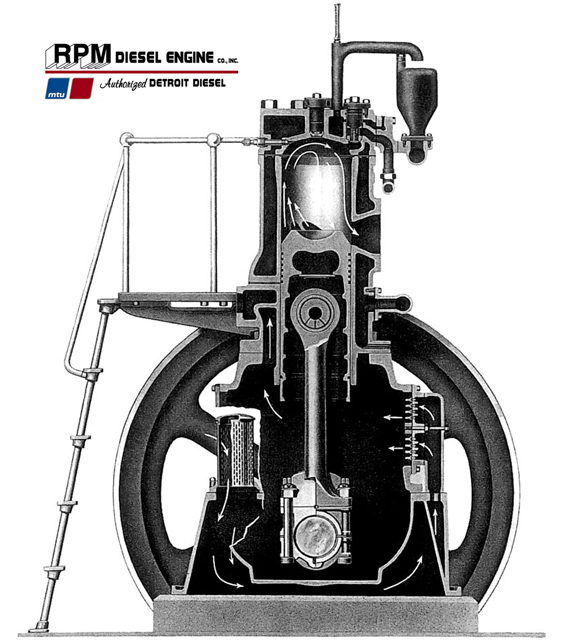
Since the 1900s, the Diesel engine has been traversing around the globe in many different forms. From generators to ships and submarines to heavy construction equipment and locomotives. Only since the around the seventies have we been putting these highly efficient engines in cars and trucks. The diesel engine has changed our planet slowly but surely, connecting every continent in previously unthinkable passages of trade. Countries that would previously never think of trading perishable foods were now able to. The diesels efficiency and speed make it the choice for almost every major shipping company on the ocean today. The Diesel engine or compression engine utilizes adiabatic compression, which means fuel is ignited when it is injected into the chamber of combustion due to the high temperature that gasses reach when highly compressed. This is different from spark engine systems which rely on a spark to ignite the gaseous fuel in the combustion chamber mixed with air to provide the explosion or combustion that will transfer the energy to the drive shaft. The also have glow which are in place to help out with starting in cold weather and when the engine is using a lower compression ratio. These are a few of the things that make the design of a diesel engine differ from a gas engine. However, it is not just the mechanics of the diesel engine that are unique, but also the man who created it.
The diesel engine was invented by Rudolf Christian Karl Diesel, a german inventor who was previously working as a bookbinder. Rudolf Christian Karl Diesel was forced to live with his aunt and uncle during the Franco-Prussian wars when he was only twelve. Rudolf’s Uncle was a mathematician in the school where he attended, this may have aided Rudolf Christian Karl in his understanding of complex formulas and possibly was the cause leading to his invention of the diesel engine.
The circumstances involving Rudolf Christian Karl are a bit mysterious in that his disappearance was on a ship traveling in the english channel. Rudolf’s diary was found with a cross through the date sep 29th. His bed had not been slept in and his clothes were folded. Before his journey he gave his wife a bag and told her to wait two weeks and then to open it up, she found 200,000 German marks which would have been $1.2 million in todays exchange. The legacy of Diesel’s engine invention had now become the replacement of the steam engine in every different application that you can imagine. In the following years after the invention you could see adoption of this amazing technology in every industry. The transition from steam to Diesel had to happen.
Diesel engines are mostly used in vehicles where weight limitations are not an issue. Diesel engines can go 20% to 35% longer on a gallon of petrol or diesel fuel than gasoline engines can. Rudolf Christian Karl Diesel knew that almost all of the energy in a steam engine was wasted- near 90%- and consumed much more fuel than needed. The knowledge of thermodynamics and the heating of water to produce gas or steam can be said to have influenced the Diesel engines design which utilizes adiabatic compression.
If you would like more info on Diesel engines, maintenance repairs, consultation or parts you can contact us at 1-800-660-6304 www.rpmdiesel.com
Diesel Engine
![]()
